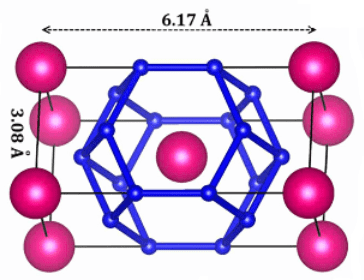Nov 11 2019
A group of scientists led by Artem Oganov of Skoltech and the Moscow Institute of Physics and Technology, and Ivan Troyan of the Institute of Crystallography of RAS has succeeded in synthesizing thorium decahydride (ThH10), a new superconducting material with the very high critical temperature of 161 kelvins. The results of their study, supported by a Russian Science Foundation grant, were published in the journal Materials Today.
 Figure 1. Crystal structure of thorium decahydride, ThH10. Credit: Dmitry Semenok et al./Materials Today
Figure 1. Crystal structure of thorium decahydride, ThH10. Credit: Dmitry Semenok et al./Materials Today
A truly remarkable property of quantum materials, superconductivity is the complete loss of electrical resistance under quite specific, and sometimes very harsh, conditions. Despite the tremendous potential for quantum computers and high-sensitivity detectors, the application of superconductors is hindered by the fact that their valuable properties typically manifest themselves at very low temperatures or extremely high pressures.
Until recently, the list of superconductors was topped by a mercury-containing cuprate, which becomes superconducting at 135 kelvins, or −138 degrees Celsius. This year, lanthanum decahydride, LaH10, set a new record of −13 C, which is very close to room temperature. Unfortunately, that superconductor requires pressures approaching 2 million atmospheres, which can hardly be maintained in real-life applications. Scientists therefore continue their quest for a superconductor that retains its properties at standard conditions.
In 2018, Alexander Kvashnin, a researcher at Oganov’s lab, predicted a new material — thorium polyhydride, or ThH10 (fig. 1) — with a critical temperature of −32 C, stable under 1 million atmospheres. In a recent study, researchers from Skoltech, MIPT, the Institute of Crystallography and Lebedev Institute of Physics of the Russian Academy of Sciences (RAS) have successfully obtained ThH10 and studied its transport properties and superconductivity.
The team’s findings corroborated the theoretical predictions, proving that ThH10 exists at pressures above 0.85 million atmospheres and exhibits amazing high-temperature superconductivity. The scientists could only determine the critical temperature at 1.7 million atmospheres and found it to be −112 C, which is consistent with the theoretical prediction for that pressure value. This makes ThH10 one of the record-breaking high-temperature superconductors.
“Modern theory, and in particular, the USPEX method developed by myself and my students, yet again displayed their amazing predictive power,” said Skoltech and MIPT Professor Artem Oganov, who co-directed the study. “ThH10 pushes the boundaries of classical chemistry and possesses unique properties that were predicted theoretically and recently confirmed by experiment. Most notably, the experimental results obtained by Ivan Troyan’s lab are of very high quality.”
“We discovered that superconductivity predicted in theory does exist at −112 C and 1.7 million atmospheres,” study co-director Ivan Troyan added. “Given the strong consistency between theory and experiment, it would be interesting to check whether ThH10 will show superconductivity at up to −30 C…−40 C and lower pressures as predicted.”
“Thorium hydride is just one of the elements in a large and rapidly growing class of hydride superconductors,” said the first author of the study, Skoltech PhD student Dmitry Semenok. “I believe that in the coming years, hydride superconductivity will expand beyond the cryogenic range to find application in the design of electronic devices.”